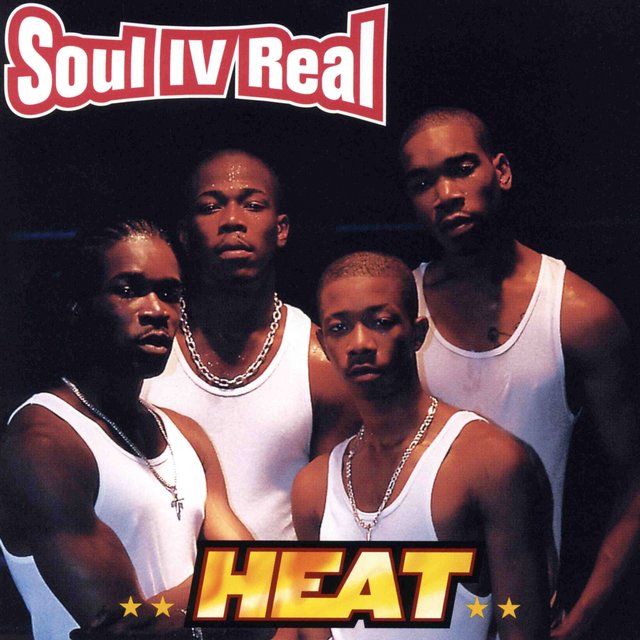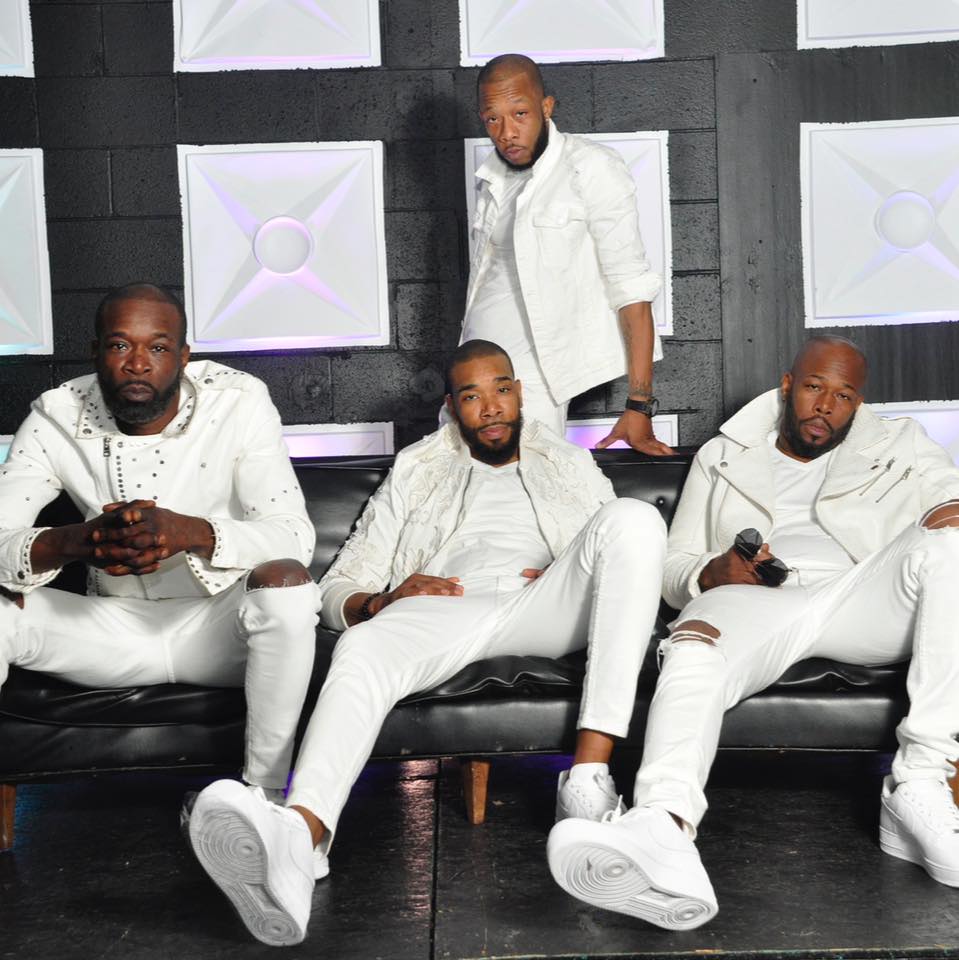If you’re at a Black family cookout, chances are you’ll hear Soul for Real’s “Candy Rain” or “Every Little Thing I Do” blasting through the speakers.
The R&B quartet — composed of brothers Jase, Brian, Dre and Choc — made their official introduction with their 1995 debut album Candy Rain via Uptown Records. Five months after its release, the album was certified platinum by the Recording Industry Association of America (RIAA) in August 1995.
While Candy Rain was a success, including the aforementioned gold-selling singles, their second album, For Life, was not met with the same reception. Their third album, Heat, independently released in 1999, wasn’t a commercial success either.
Although the group has been around for 25 years, they’ve been relatively quiet about their story — until now. On March 6, TV One’s hit docuseries Unsung returned, featuring an in-depth look at R&B group’s decade-spanning career.
In the episode, Soul for Real shared the story behind their formation, recounted how Heavy D discovered them and reflected on their early success. They also opened up about some of their challenges, including their dwindled relationship with Heavy D, their concerns during their sophomore album era, financial woes and more.
It’s a couple of days after the air date and the brothers (excluding Dre) are on a Zoom call with Rated R&B, reflecting on the stories they shared with viewers.
“For so long, people have identified with the record, but they haven’t put a face to the record. That in itself was huge — being able to tell our story, a part of our story,” Brian tells Rated R&B. “I think the Unsung [episode] is kind of the tip of the iceberg.”
In Rated R&B’s interview with Soul for Real, the brothers go into depth about their recent Unsung episode, explain why they don’t like to acknowledge their third album, their plans for a 25th-anniversary album and tour, their experience running a family restaurant and more.
Jase, in the episode, you briefly spoke about the pressures that came with being the youngest and the lead singer of the group. If you could give your younger self one piece of advice, what would it be?
To not take things out so much on myself. But really, my mind is just like this: Everything happens for a reason. If you saw the movie The Butterfly Effect, if there was a change somewhere, life wouldn’t be how it is now and things could be completely different. I wouldn’t wish to go back and tell myself to change anything.
In the episode, you all talked about how you came together to voice your concerns to Heavy D about doing a remix to “Every Little Thing I Do,” which would prevent Choc from having a lead vocal. Looking back, is there anything that you would’ve done differently during that confrontation?
CHOC: I guess I should take that question because that was my ordeal and conflict that I had with [Heavy D.] My feelings never changed about how I felt about the remix to the song I was already known for. It was just a little something that happened between us that we got past. Even though things went in a different direction, we still grew past that. Before he passed, we got to interact. He was considering doing something with us again.
Brian, you revealed that “If You Want It” is one of the best songs you recorded. So, Choc and Jase: Is there one song that’s a personal favorite or brings back good memories?
CHOC: I agree with Brian. I like how Jase sounded on “If You Want It” and “I Wanna Be Your Friend.”
JASE: “Every Little Thing I Do” was an absolute favorite and “Thinking of You.”
“Candy Rain” and “Every Little Thing I Do” were the group’s signature songs and both earned you RIAA certifications. Those songs still get played today! As you mentioned, you guys haven’t shared much of your story over the years (until now) and are allowing people to get to know you more. Do you think those songs were bigger than the group itself?
JASE: Absolutely not.
CHOC: I agree [with Jase]. I think those songs were just an extension of what our talent is.
JASE: That’s a dope question, though.
CHOC: Yeah, I like that question. I feel like those songs just signified our talent.
BRIAN: I actually disagree and agree that the songs overshadowed us, only because we didn’t reach our greatest potential. The songs kind of reached our potential for us and surpassed it. I get what Choc is saying, but because of things that happened — the creative differences — the label stifled our chances to be able to show any different records. But, I’m thankful that [those songs] did carry us for 27 years. These records still have relevancy, so we’re honored.
Given the success of your first album, you guys wanted more creative freedom on the second album, particularly with songwriting. You ultimately got writing credit on five tracks. Did your initial vision for the album align with your label?
CHOC: We were open to whatever vision the label had for us. We just wanted input and a little more creative control than what was given in the first round. From day one, we were looking to display our writing talent. We wanted what we thought we deserved — publishing.
BRIAN: It was kind of pointless to give us five writing credits. These are the intricate details that you will not necessarily get fully from the episode, but — wink, wink — “The Soul for Real Story” is going to give you more in-depth detail. We got the five credits, but there was no promotion and marketing. The credits are worthless on that album. People were like, “We didn’t even know you guys had a new album now.”

Your third album, Heat, turns 24 in May. What’s the first memory that comes to mind?
BRIAN: I think we all want to act like the third album didn’t exist (laughs). I believe that we had great songs on the album. It was just the professional experience from that album and the people involved with that whole situation that was a horrible experience.
CHOC: Two thumbs down (laughs). Don’t get us wrong. We still appreciate the love, but we’ve grown so much since then.
Over the last few years, Soul for Real has dropped a few singles. There’s a 25th-anniversary album in the works. What can you tell about the direction you’re taking with the album?
JASE: It’s what we’re really about. When you listen, you can hear what I mean about what we trying to do.
BRIAN: We’re coming to fill a void. It’s like a cycle. We were so fortunate enough to come into the industry so young. To be alive now, be marketable and sound good, it’s like, “Okay, we can catch that cycle again and kind of marry the new audience with the old audience.” Right now, the young kids have no idea who we are. But great music is great music, and it’s timeless. We’re ready to give everybody music to feel good about and love and band-aid whatever you’re going through.
You’re also planning an anniversary tour. How is that coming along?
BRIAN: The tour is in the making. It’s actually being snowballed into a tour. We’re documenting the experience, so that’s why it’s taking time. We dropped the new record [called] “After the Rain” as the initial [single]. It’s the introduction to Soul for Real’s current presence for the world. It’s our story in three minutes.
CHOC: It’s a song that is very relatable. Everybody can relate to going through something in life, and that’s what it’s going to remind you of.
JASE: The second single will drop soon.

How do you balance the family dynamic with your professional life as brothers?
CHOC: I think my brothers all agree; we don’t even think about balancing it. Our roots go so far back. It’s just something that’s been instilled from our parents. The unity that we have, even if we tried to shake it, we can’t.
JASE: You have some really good questions. When you’re doing business with family, it’s about learning each other’s different styles of doing business and growing with each other on that level.
Speaking of family and business, you guys own and operate Naomi’s Caribbean Cuisine, located in Atlanta and Las Vegas. Brian, you launched an employment program called S.L.A.P. (Successful Living After Prison), which employs newly released men and women. As someone who has served time in prison, what was your vision for this program?
BRIAN: I think it’s really important. I think everybody has a family member or knows of someone who is incarcerated. The U.S. prison system is crazy. It’s a business and it affects so many different people.
It’s a topic that a lot of people are embarrassed about or want to shy away from, but it’s something that needs to be addressed. I try to do my part. I have to make that opportunity for people that come out because I know what it’s like to come out [of prison], not have anything thing but that F [felony] on your report card.
https://www.youtube.com/watch?v=GlSsFdpxukU

